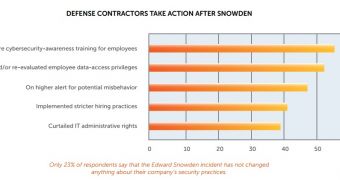Ever since Edward Snowden pulled off what some call the biggest leak in history, defense contractors have started taking steps to ensure that the next individual who does such a thing is not one of their employees.
According to a new study from ThreatTrack Security, 75% of the IT/security managers and staff they’ve interviewed say their organizations have made changes to security practices.
41% of defense contractors are more careful about who they hire. Over half of them give their employees more cybersecurity awareness training.
52% have taken a better look at the data access privileges their employees have. 39% of companies have restricted the IT administrative rights of staff.
47% of respondents have revealed that their companies are concerned about insider threats, being on higher alert for anomalous activities carried out by employees.
The survey has also focused on defense contractors’ ability to protect their infrastructures against cyberattacks. Most respondents are confident that government guidance on sensitive data protection is good.
However, many of them are still concerned about advanced persistent threats (APTs), cyber espionage, sophisticated cybercrime and targeted malware attacks.
"It's interesting to note that while defense contractors seem to have better security practices in place and are more transparent than many companies in the private sector, they are finding the current cyber threat onslaught just as difficult to deal with," Commented ThreatTrack Security President and CEO Julian Waits, Sr.
"Well over half are concerned that they are vulnerable to targeted attacks and cyber-espionage, and given the type of data they are handling and storing, we think that number needs to get a lot smaller – and fast," Waits added.
The complete study is available on ThreatTrack Security’s website. The survey has been conducted by Opinion Matters. 100 people have been interviewed. 63% of them hold secret, top secret or confidential clearances.

 14 DAY TRIAL //
14 DAY TRIAL //